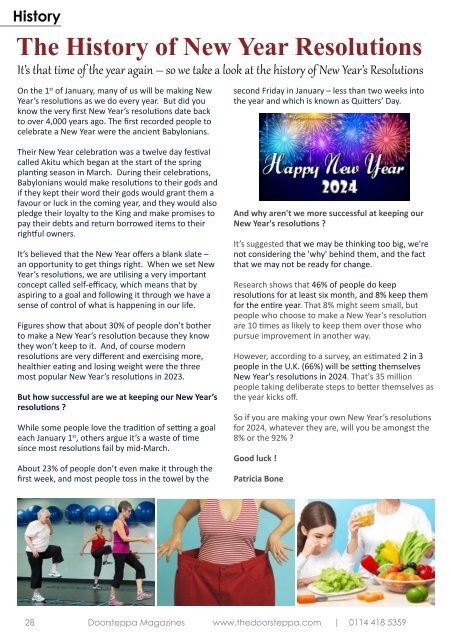Halfway Jan 2024 Version 2
You also want an ePaper? Increase the reach of your titles
YUMPU automatically turns print PDFs into web optimized ePapers that Google loves.
History<br />
The History of New Year Resolutions<br />
It’s that time of the year again – so we take a look at the histor of New Year’s Resolutions<br />
On the 1 st of <strong>Jan</strong>uary, many of us will be making New<br />
Year’s resoluons as we do every year. But did you<br />
know the very first New Year’s resoluons date back<br />
to over 4,000 years ago. The first recorded people to<br />
celebrate a New Year were the ancient Babylonians.<br />
second Friday in <strong>Jan</strong>uary – less than two weeks into<br />
the year and which is known as Quiers’ Day.<br />
Their New Year celebraon was a twelve day fesval<br />
called Akitu which began at the start of the spring<br />
planng season in March. During their celebraons,<br />
Babylonians would make resoluons to their gods and<br />
if they kept their word their gods would grant them a<br />
favour or luck in the coming year, and they would also<br />
pledge their loyalty to the King and make promises to<br />
pay their debts and return borrowed items to their<br />
righul owners.<br />
It’s believed that the New Year offers a blank slate –<br />
an opportunity to get things right. When we set New<br />
Year’s resoluons, we are ulising a very important<br />
concept called self-efficacy, which means that by<br />
aspiring to a goal and following it through we have a<br />
sense of control of what is happening in our life.<br />
Figures show that about 30% of people don’t bother<br />
to make a New Year’s resoluon because they know<br />
they won’t keep to it. And, of course modern<br />
resoluons are very different and exercising more,<br />
healthier eang and losing weight were the three<br />
most popular New Year’s resoluons in 2023.<br />
But how successful are we at keeping our New Year’s<br />
resoluons ?<br />
While some people love the tradion of seng a goal<br />
each <strong>Jan</strong>uary 1 st , others argue it’s a waste of me<br />
since most resoluons fail by mid-March.<br />
About 23% of people don’t even make it through the<br />
first week, and most people toss in the towel by the<br />
And why aren't we more successful at keeping our<br />
New Year's resoluons ?<br />
It’s suggested that we may be thinking too big, we're<br />
not considering the 'why' behind them, and the fact<br />
that we may not be ready for change.<br />
Research shows that 46% of people do keep<br />
resoluons for at least six month, and 8% keep them<br />
for the enre year. That 8% might seem small, but<br />
people who choose to make a New Year's resoluon<br />
are 10 mes as likely to keep them over those who<br />
pursue improvement in another way.<br />
However, according to a survey, an esmated 2 in 3<br />
people in the U.K. (66%) will be seng themselves<br />
New Year's resoluons in <strong>2024</strong>. That's 35 million<br />
people taking deliberate steps to beer themselves as<br />
the year kicks off.<br />
So if you are making your own New Year’s resoluons<br />
for <strong>2024</strong>, whatever they are, will you be amongst the<br />
8% or the 92% ?<br />
Good luck !<br />
Patricia Bone<br />
28 Doorsteppa Magazines www.thedoorsteppa.com | 0114 418 5359
















